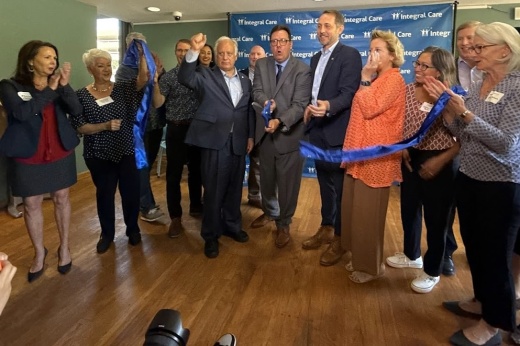The why
After a report in 2023 indicated that roughly 40% of all incarcerated people in Travis County Jail suffer from mental illness, county and city leaders put their heads and budgets together to launch a Crisis Care Diversion program aimed at keeping people with mental illness out of jail.
The new therapeutic diversion center represents the second half of a program that helps to reduce the number of individuals with mental illness being arrested for nonviolent offenses and repeatedly cycling through the jail system.
“We are leveraging existing programs and facilities to expand services and address unmet community needs,” Integral Care CEO Jeff Richardson said in a news release. “The goal is to divert people who need psychiatric help and are accused of minor offenses from going to jail. This program will increase access to mental health services, thereby decreasing the number of individuals who are arrested due to unmet mental health needs.”
The $23.7 million project received funding from the county, city of Austin and Central Health, as well as a state grant and funding within Integral Care’s own budget.The program will comprise two components: "a place to go and a place to stay," according to an email from Debra Joiner, Integral Care’s director of communication.
A place to go
The county first launched a pilot program early this year, expanding Integral Care’s Psychiatric Emergency Services, or PES, which focuses on immediate care for those in the throes of mental health crises that would otherwise be taken to jail, the emergency room or are homeless.
Integral Care's urgent PES is now open 24/7. The program is voluntary and prioritizes nonviolent misdemeanor cases.
The existing facility at the Richard E. Hopkins Behavioral Health Building will be adding additional peer support and expanding its medical staff to include those who can prescribe medication. A new 23-hour observation service will also be available.
Integral Care case workers will not be assigned to more than five clients at a time to give more individualized care, Integral Care officials previously told county commissioners. Additionally, the facility will offer the following wraparound mental health services:
- Harm reduction
- Nutrition counseling
- Housing navigation
- Medical and psychiatric care
A place to stay
Integral Care’s Geneveive Tarlton Hearon building, which is owned by the city of Austin, has been transformed into the new therapeutic diversion program, a 25-bed facility for adults 18 and older.
This facility will provide extended therapeutic care and support services.
The program will blend the city of Austin’s bridge housing model with more intensive therapeutic services, offering things like intake assessments, psychiatric evaluations, medication management, therapy, peer support, case management, and help with long-term housing and benefits, according to Joiner.
Individuals can stay for up to 90 days to stabilize and get connected to ongoing care. The building, located on East 15th Street, will not be open for walk-ins but on referral only.
This aspect of the program is designed for adults dealing with a mental health crisis who are either involved with or at risk of getting involved with the justice system—often those who typically cycle through jails, emergency rooms or states of homelessness.
The big picture
The program offers targeted treatment options to help people avoid ending up in jail or emergency rooms, which often are not equipped with a toolkit that best handles mental health crises.
The county’s Crisis Care Diversion provides first responders and the legal system better community-based solutions for those needing mental health care, reducing the need to rely on jails as a main source of treatment.
Currently, the program has been designed as a three-year pilot.
This pilot will inform current planning efforts for a larger, more encompassing diversion system for the Travis County community that can better serve individuals with complex behavioral health needs, according to a statement from Integral Care.
One more thing
Reducing recidivism in the criminal legal system can lead to big savings.
Williamson County, just to the north of Travis County, launched a similar program back in 2022.
“It's cost-effective, and it's saving taxpayers money by getting the correct resources out,” said Kathy Pierce, board chair of the Williamson County and Cities Health District, during a review of the Williamson County Diversion program earlier this year.
She said booking an individual in jail is one of the most expensive costs for the county.
By diverting first responders, Williamson County saves an average of $1,367 per call, according to county documents. Additionally, the average cost of incarceration is $549 a day with an average stay of five days.
In addition, first responders save time as looking for a psychiatric hospital bed, transporting individuals to an emergency room or processing them through jail booking can take hours.





